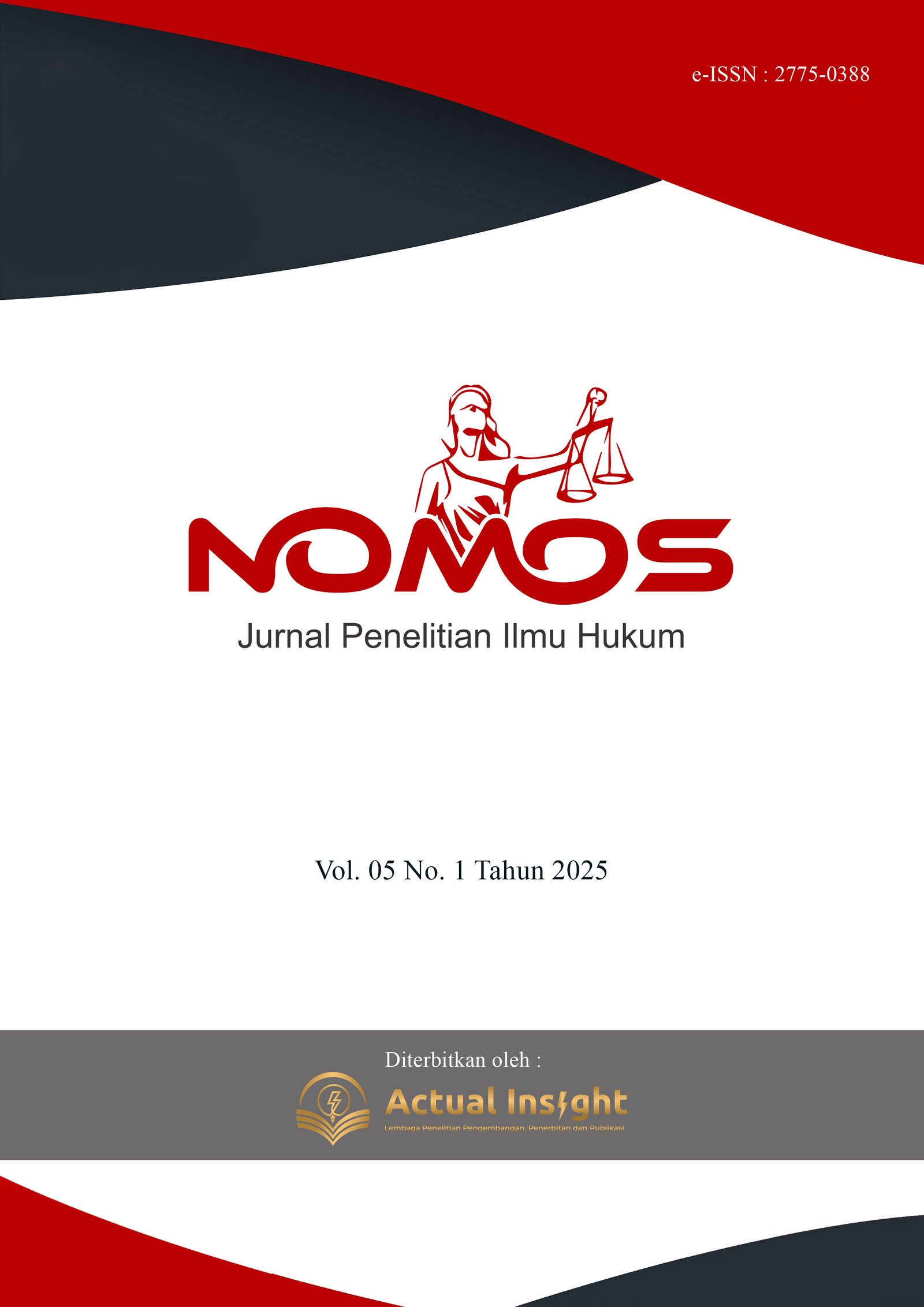

Implikasi Reformulasi Delik Penodaan Agama terhadap Kebebasan Beragama dan Berkeyakinan dalam Undang-Undang Nomor 1 Tahun 2023
-
Universitas Padjadjaran
-
Universitas Padjadjaran
-
Universitas Padjadjaran
DOI:
https://doi.org/10.56393/nomos.v5i1.3023-
Indonesia masih menghadapi tantangan serius dalam menjamin perlindungan agama dan kebebasan berkeyakinan di tengah diskriminasi terhadap kelompok minoritas serta konflik antarumat beragama. Penelitian ini bertujuan menganalisis reformulasi delik penodaan agama dalam Undang-Undang Nomor 1 Tahun 2023 dan implikasinya terhadap kebebasan beragama. Metode yang digunakan adalah penelitian hukum normatif dengan pendekatan perundang-undangan, konseptual, dan perbandingan, khususnya terhadap Pasal 18 International Covenant on Civil and Political Rights (ICCPR). Hasil penelitian menunjukkan bahwa meskipun reformulasi bertujuan memperjelas sanksi dan melindungi martabat agama, ketidakjelasan frasa ‘penghinaan agama’ membuka ruang diskresi berlebihan bagi penegak hukum yang berpotensi disalahgunakan. Dominasi tafsir ahli agama tanpa standar objektif memperkuat bias mayoritas dan mengancam prinsip keadilan serta kesetaraan. Penelitian ini merekomendasikan pembatasan ruang lingkup penghinaan agama pada ancaman nyata terhadap ketertiban umum, integrasi prinsip HAM dalam penafsiran hukum, serta penguatan mekanisme judicial review yang independen.
-
Adnan, I. (2023). Kebijakan Penal Dan Non Penal Pemerintah Dalam Penanggulangan Tindak Pidana Penodaan Agama Di Indonesia. Fitua: Jurnal Studi Islam, 4(2), 160–180. https://doi.org/10.47625/FITUA.V4I2.510
Ahdad, A., Jaya, B. P. M., & Rofiana, R. (2023). Sanksi Pidana terhadap Pelaku Penista Agama Studi Kasus Putusan Pengadilan Negeri Pandeglang Nomor : 28/Pid.Sus/2018/PN Pdl. Yustisia Tirtayasa, 3(2), 156. https://doi.org/10.51825/yta.v3i2.19585
Akbar, M. M. F. (2022). Legal Protection for Tolerance and Freedom Among Religious People in Indonesia. Contemporary Issues on Interfaith Law and Society, 1(1), 39–58. https://doi.org/10.15294/CIILS.V1I1.56712
Anggraeny, K. D. (2017). Penafsiran Tindak Pidana Penodaan Agama Dalam Perspektif Hukum. 2(2), 217569. https://doi.org/10.24912/ERA
Colbran, N. (2010). Realities and challenges in realising freedom of religion or belief in Indonesia. International Journal of Human Rights, 14(5), 678–704. https://doi.org/10.1080/13642980903155166
Cox, N. (2020). Justifying Blasphemy Laws: Freedom of Expression, Public Morals, and International Human Rights Law. Journal of Law and Religion, 35(1), 33–60. https://doi.org/10.1017/JLR.2020.11
Cumper, P., & Lewis, T. (2019). Human rights and religious litigation - faith in the law. Oxford Journal of Law and Religion, 8(1), 121–150. https://doi.org/10.1093/OJLR/RWZ005
Doomen, J. (2021). Blasphemy in an Age of Corroding Secularity. Law and Critique, 32(1), 51–67. https://doi.org/10.1007/S10978-020-09268-6
Farag, M. (2011). Protection of beliefs or believers: incitement to religious hatred replacing blasphemy and defamation of religion. https://fount.aucegypt.edu/cgi/viewcontent.cgi?article=1969&context=etds
Fernando, Z. J., Wulandari, S., & Putra, P. S. (2023). Potential Overcriminalization in Religious Offenses: A Critical Analysis Of The Formulation Of The New National Criminal Code (Law 1 Number 2023). Jurnal HAM, 14(3), 205. https://doi.org/10.30641/HAM.2023.14.205-216
Hasani, I., & Halili. (2022). Human Rights and Constitutionality Issues of Blasphemy Law in Indonesia. Jurnal Konstitusi, 19(2), 406–430. https://doi.org/10.31078/JK1927
Hunter, M. (2023). Prevention of Faith-Based Violence as a Response to ‘Blasphemy’ in Pakistan. IPRI Journal (Print), 23(02), 1–24. https://doi.org/10.31945/iprij.230201
Husni, H., Zulfan, Z., Yudi Afrizal, T., Nurarafah, N., & Sumiadi, S. (2022). Religious Diversity and its Legal Problems. Journal Research of Social, Science, Economics, and Management, 1(9). https://doi.org/10.36418/JRSSEM.V1I9.149
Indrayanti, K. W., & Saraswati, A. A. A. N. (2022). Criminalizing and penalizing blasphemy: the need to adopt a human rights approach in the reform of Indonesia’s blasphemy law. Cogent Social Sciences, 8(1). https://doi.org/10.1080/23311886.2022.2104704
Irawan, D. (2023). Kekerasan Atas Nama Agama Dan Solusi Konflik Membangun Perdamaian. Borneo : Journal of Islamic Studies, 3(2), 107–116. https://doi.org/10.37567/BORNEO.V3I2.1964
Irawanto, I., & Santiago, F. (2023a). Juridical Analysis of Blasphemists of Religion Based on Criminal Perspective. Journal of World Science, 2(4), 559–565. https://doi.org/10.58344/JWS.V2I4.280
Irawanto, I., & Santiago, F. (2023b). Juridical Analysis of Blasphemists of Religion Based on Criminal Perspective. Journal of World Science, 2(4), 559–565. https://doi.org/10.58344/JWS.V2I4.280
Karmawan, K., & Abdillah, M. (2020). Settlement Through Mediation Between the Normative and Practice in Religious Judiciary Agencies. Jurnal Cita Hukum, 8(1), 85–102. https://doi.org/10.15408/JCH.V8I1.15002
Khairiah, K. N., Irsal, I., & Putry, N. (2023). Religious harmony forum (fkub) strategy in increasing religious moderation jurisprudence in bengkulu province. Jurnal Ilmiah Mizani : Wacana Hukum, Ekonomi Dan Keagamaan. https://doi.org/10.29300/mzn.v10i1.11285
Laksito, F. H. B. (2023). Policy discrimination against the minority group of flows of believers citizens in Indonesia: an administrative justice perspective. https://doi.org/10.62264/jlej.v1i1.5
Lindkvist, L. (2017). Religious Freedom and the Universal Declaration of Human Rights. https://www.cambridge.org/core/books/religious-freedom-and-the-universal-declaration-of-human-rights/AF314F97F5DB93AEEEDB9B5484419B1F
Mandala, O. S., Zubaedi, Z., Suparlan, S., & Munawirsajali, M. (2024). Penodaan Agama Dalam Perspektif Hukum Pidana Dan Hak Asasi Manusia Di Indonesia. Al-Balad : Jurnal Hukum Tata Negara Dan Politik Islam, 4(1), 1–21. https://doi.org/10.59259/AB.V4I1.146
Miranda Mazaya, & Tomy Michael. (2023). Penerapan Sanksi Pelaku Tindak Pidana Penodaan Agama Berdasarkan Undang-Undang No 1 Tahun 2023. Doktrin: Jurnal Dunia Ilmu Hukum Dan Politik, 2(1), 66–80. https://doi.org/10.59581/DOKTRIN.V2I1.1890
Mirsel, R. (2022). Kebebasan Beragama di Indonesia dalam Perspektif Hak Asasi Manusia. Jurnal Ledalero, 21(1), 51. https://doi.org/10.31385/JL.V21I1.269.51-69
Nainggolan, P. F., Ikhsan, R. M., Albariansyah, H., & Sinaga, J. C. (2024). Interpretation and Application of Criminal Law Regarding Blasphemy Under Article 156a of the Criminal Code. Ius Poenale, 5(1), 69–78. https://doi.org/10.25041/IP.V5I1.3552
Nalle, V. I. W. (2017). Blasphemy Law and Public Neutrality in Indonesia. Mediterranean Journal of Social Sciences, 8(2), 57–62. https://doi.org/10.5901/MJSS.2017.V8N2P57
Neimanis, J., & Matjusina, R. (2012). Judge impartiality in comprehensive judicial development. European Integration Studies, 5, 87–91. https://doi.org/10.5755/J01.EIS.0.5.1081
Purwandari, R., & Aprilia, N. R. (2022). Peran Forum Kerukunan Umat Beragama dalam Menyelesaikan Konflik Keagamaan. JIE (Journal of Islamic Education), 7(2), 198. https://doi.org/10.52615/jie.v7i2.261
Puspa, I. W., Suradana, I. M., Syaifullah, S., Kurniawan, T. L., & Ikbal, M. (2023). Kebebasan Beragama Perspektif Hak Asasi Manusia. Ganec Swara, 17(3), 1257. https://doi.org/10.35327/GARA.V17I3.574
Rahmadianto, M. (2024). Study of Law Number 1 of 2023 concerning the Criminal Code (KUHP). Enigma in Law, 1(2), 41–44. https://doi.org/10.61996/LAW.V1I2.36
Ramadhan, I. D. U. H., & Faozi, A. (2023). Facing Challenges of Discrimination Against Local Religious Beliefs in Indonesia. Jurnal Hukum Sehasen, 9(2). https://doi.org/10.37676/JHS.V9I2.5055
Rasyid, Abd., & Wasil, W. (2024). UN Resolution 16/18: An Attempt to Reconstruct the Indistinctness of the Blasphemy Law in Religious Life in Contemporary Indonesia. Ilmu Ushuluddin, 10(2), 148–174. https://doi.org/10.15408/IU.V10I2.37313
Rohmah, E. I. (2024). Dinamika Kekuasaan Dalam Penyelesaian Konflik Antar Agama. Jurnal Ilmiah Ilmu Ushuluddin, 22(2), 157–169. https://doi.org/10.18592/jiiu.v22i2.11517
Safrina, N., Yusrizal, Y., & Zulkifli, Z. (2022). Analisis Hukum Pidana Dan Kriminologi Terhadap Tindak Pidana Penistaan Agama Di Indonesia. REUSAM: Jurnal Ilmu Hukum, 10(1), 37. https://doi.org/10.29103/REUSAM.V10I1.8912
Sari, M. (2022). Kebhinekaan dan Keberagaman : Kerukunan Umat Beragama di Tengah Pluralitas. MASALIQ, 2(2), 282–299. https://doi.org/10.58578/MASALIQ.V2I2.317
Sedletchi, N. (2023). The right to freedom of conscience - dimensions conceptual-legal. Vector European: Revistă Ştiinţifico-Practică, 2, 24–30. https://doi.org/10.52507/2345-1106.2022-2.06
Shareef, S. (2024). Redefining Protection: Challenges and Solutions in Safeguarding Religious Minorities within International and Regional Legal Frameworks. The Age of Human Rights, 23, e8659. https://doi.org/10.17561/tahrj.v23.8659
Siddik, S. (2022). The Origin of the Indonesian Blasphemy Law and its Implication towards Religious Freedom in Indonesia. Tebuireng: Journal of Islamic Studies and Society, 3(1), 17–33. https://doi.org/10.33752/TJISS.V3I1.3648
Silfiah, R. I., & Zulkarnain, Z. (2022a). Perkembangan Delik Penodaan Agama Di Indonesia: Perspektif Historis Konstitusional. Widya Yuridika, 5(2), 461. https://doi.org/10.31328/WY.V5I2.3787
Silfiah, R. I., & Zulkarnain, Z. (2022b). Perkembangan Delik Penodaan Agama Di Indonesia: Perspektif Historis Konstitusional. Widya Yuridika, 5(2), 461. https://doi.org/10.31328/WY.V5I2.3787
Syam, N., & Basyid, A. (2024). Pattern of Problem Solving in Religious Harmony Forum. Millati: Journal of Islamic Studies and Humanities, 9(1), 1–19. https://doi.org/10.18326/millati.v9i1.660
Taylor, P. M., & O’Sullivan, M. (2021). A Commentary on the International Covenant on Civil and Political Rights: The UN Human Rights Committee’s Monitoring of ICCPR Rights. The Australian Year Book of International Law Online, 39(1), 317–320. https://doi.org/10.1163/26660229-03901018
Temperman, J. (2012). Blasphemy, Defamation of Religions & Human Rights Law. Social Science Research Network. https://papers.ssrn.com/sol3/papers.cfm?abstract_id=2041292
Visconsi, E. (2025). Blasphemy culture, blasphemy law. Elgar Concise Encyclopedia of Law and Literature, 46–48. https://doi.org/10.4337/9781803925912.CH13
Wahid, G. S., Asyrafi, M. M., Ismail, I., Ilhami, A. A., & Abdillah, M. T. (2023a). Hukum Penodaan Agama Perspektif Fikih, Perundang-Undangan Indonesia, Dan Hukum Internasional. Mitsaqan Ghalizan, 3(2), 1–10. https://doi.org/10.33084/MG.V3I2.6315
Wardana, K. A., Rahayu, R., & Sukirno, S. (2024b). Redefining Indonesia’s Blasphemy Law In The Digital Age: A Human Rights Perspective. Diponegoro Law Review, 9(1), 19–35. https://doi.org/10.14710/DILREV.9.1.2024.19-35
Warjiyati, S., Ibrahim, K. M., Salam, S., & Faruq, U. Al. (2022). Complaint Authority for Constitutional Complaint by Indonesia TMs Constitutional Court. Jurnal IUS Kajian Hukum Dan Keadilan, 10(2), 303–315. https://doi.org/10.29303/ius.v10i2.1070
-
Downloads
Download data is not yet available.
How to Cite
Indexed by:

This work is licensed under a Creative Commons Attribution-ShareAlike 4.0 International License.














